
This is a list of characters from Ulysses by James Joyce.

This is a list of characters from Ulysses by James Joyce.
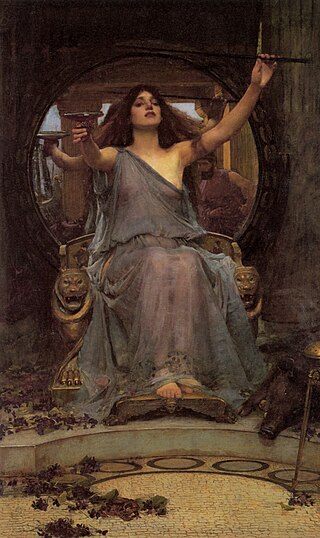
Circe is an enchantress and a minor goddess in ancient Greek mythology and religion. In most accounts, Circe is described as the daughter of the sun god Helios and the Oceanid nymph Perse. Circe was renowned for her vast knowledge of potions and herbs. Through the use of these and a magic wand or staff, she would transform her enemies, or those who offended her, into animals.
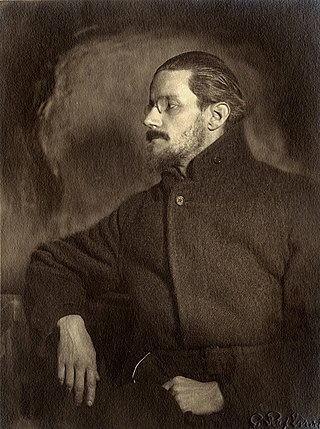
James Augustine Aloysius Joyce was an Irish novelist, poet and literary critic. He contributed to the modernist avant-garde movement and is regarded as one of the most influential and important writers of the 20th century. Joyce's novel Ulysses (1922) is a landmark in which the episodes of Homer's Odyssey are paralleled in a variety of literary styles, particularly stream of consciousness. Other well-known works are the short-story collection Dubliners (1914), and the novels A Portrait of the Artist as a Young Man (1916) and Finnegans Wake (1939). His other writings include three books of poetry, a play, letters, and occasional journalism.
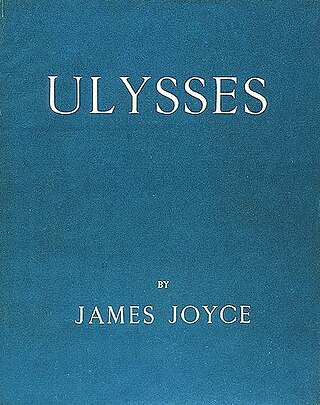
Ulysses is a modernist novel by the Irish writer James Joyce. Parts of it were first serialized in the American journal The Little Review from March 1918 to December 1920, and the entire work was published in Paris by Sylvia Beach on 2 February 1922, Joyce's fortieth birthday. It is considered one of the most important works of modernist literature and has been called "a demonstration and summation of the entire movement." According to the writer Declan Kiberd, "before Joyce, no writer of fiction had so foregrounded the process of thinking."

Leopold Bloom is the fictional protagonist and hero of James Joyce's 1922 novel Ulysses. His peregrinations and encounters in Dublin on 16 June 1904 mirror, on a more mundane and intimate scale, those of Ulysses/Odysseus in Homer's epic poem: The Odyssey.

Bloomsday is a commemoration and celebration of the life of Irish writer James Joyce, observed annually in Dublin and elsewhere on 16 June, the day his 1922 novel Ulysses takes place on a Thursday in 1904, the date of his first sexual encounter with his wife-to-be, Nora Barnacle, and named after its protagonist Leopold Bloom.

A Portrait of the Artist as a Young Man is the first novel of Irish writer James Joyce, published in 1916. A Künstlerroman written in a modernist style, it traces the religious and intellectual awakening of young Stephen Dedalus, Joyce's fictional alter ego, whose surname alludes to Daedalus, Greek mythology's consummate craftsman. Stephen questions and rebels against the Catholic and Irish conventions under which he has grown, culminating in his self-exile from Ireland to Europe. The work uses techniques that Joyce developed more fully in Ulysses (1922) and Finnegans Wake (1939).

Stephen Dedalus is James Joyce's literary alter ego, appearing as the protagonist and antihero of his first, semi-autobiographic novel of artistic existence, A Portrait of the Artist as a Young Man (1916), and as a major character in his 1922 novel Ulysses. Stephen mirrors many facets of Joyce's own life and personality. Joyce was a talented singer, for example, and in Ulysses Leopold Bloom notes the excellence of Stephen's tenor voice after hearing him sing Johannes Jeep's song "Von der Sirenen Listigkeit".

Molly Bloom is a fictional character in the 1922 novel Ulysses by James Joyce. The wife of main character Leopold Bloom, she roughly corresponds to Penelope in the Odyssey. The major difference between Molly and Penelope is that while Penelope is eternally faithful, Molly is not. Molly is having an affair with Hugh 'Blazes' Boylan. Molly, whose given name is Marion, was born in Gibraltar on 8 September 1870, the daughter of Major Tweedy, an Irish military officer, and Lunita Laredo, a Gibraltarian of Spanish descent. Molly and Leopold were married on 8 October 1888. She is the mother of Milly Bloom, who, at the age of 15, has left home to study photography. She is also the mother of Rudy Bloom, who died at the age of 11 days. In Dublin, Molly is an opera singer of some renown.

Siobhán McKenna was an Irish stage and screen actress.

Stephen Hero is a posthumously published autobiographical novel by Irish author James Joyce. It is the early version of A Portrait of the Artist as a Young Man. Its published form reflects only a portion of the manuscript: the first 518 pages have disappeared; 383 pages remain.

Fionnghuala Manon "Fionnula" Flanagan is an Irish stage, television, and film actress. Flanagan is known for her roles in the films James Joyce's Women (1985), Some Mother's Son (1996), Waking Ned (1998), The Others (2001), Four Brothers (2005), Yes Man (2008), The Guard (2011) and Song of the Sea (2014). She is also known for her recurring role as Eloise Hawking in the series Lost (2007–2010). Notable stage productions she has performed in include Ulysses in Nighttown and The Ferryman, both of which earned her Tony Award nominations for Best Featured Actress in a Play.
Malachi Roland St. John "Buck" Mulligan is a fictional character in James Joyce's 1922 novel Ulysses. He appears most prominently in episode 1 (Telemachus), and is the subject of the novel's famous first sentence: "Stately, plump Buck Mulligan came from the stairhead, bearing a bowl of lather on which a mirror and a razor lay crossed."
The Countess Cathleen is a verse drama by William Butler Yeats in blank verse. It was dedicated to Maud Gonne, the object of his affections for many years.

Ulysses is a 1967 drama film based on James Joyce's 1922 novel Ulysses. It concerns the meeting of two Irishmen, Leopold Bloom and Stephen Dedalus, in 1904 Dublin.
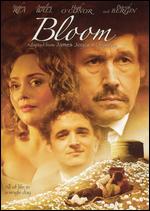
Bloom is a 2003 Irish film written and directed by Sean Walsh, based on the 1922 novel Ulysses by James Joyce. The film premiered at the 2003 Taormina Film Festival. Angeline Ball won the award for "Best Actress in a Film" at the Irish Film and Television Awards. The soundtrack was written and produced by David Kahne.
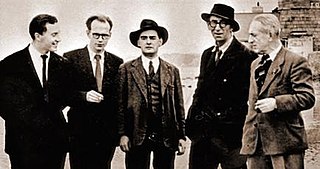
John Ryan (1925–1992) was an Irish artist, broadcaster, publisher, critic, editor, and publican.

The Ulysses broadcast occurred on Bloomsday 1982 when the Irish state broadcaster, RTÉ Radio, transmitted an uninterrupted 30-hour dramatised radio performance, by 33 actors of the RTÉ Players, of the entire text of James Joyce's epic 1922 novel, Ulysses, to commemorate the centenary of the author's birth. The broadcast was carried by live relay internationally and won a Jacob's Broadcasting Award in recognition of its achievement.
Circe, an enchantress and minor goddess in Greek mythology, appears often in 20th and 21st century popular culture, either under her own name or as a sorceress with similar powers under others. Post-Classical amplifications and reinterpretations of that story and others involving her are dealt with in the main article. The instances mentioned here are more recent allusions and adaptations.

The Citizen is a fictional character in James Joyce's novel Ulysses. In part, he is a satirical portrait of Irish nationalist Michael Cusack (1847–1906) and Joyce's portrayal operates to expose what one critic called the "xenophobic ideologies of radical Celticists".The Citizen appears to be a devotee of the Celtic Revival and Irish Republicanism and is well versed in the history of the Irish struggle for freedom against the British empire. He also appears to be interested in Arthur Griffith's program for a limited Irish autonomy modeled on Hungary's dual monarchy and uses the name of Griffith's newspaper and later of the political party he inspired as a riposte to Leopold's Bloom's assertions about the futility of armed rebellion as part of his xenophobic and anti-semitic views expressed in Barney Kiernan's pub. He ultimately accuses Bloom of being an economic parasite on the Irish and a "foreign" Jew and thus an inauthentic Irishman, as well being cursed by God for rejecting Christ's divinity as symbolized in the apocryphal Christian figure of Ahasuerus. As a gesture of his hatred, the Citizen throws a biscuit tin at Bloom as he departs from the pub. A character based on Cusack also appears in Stephen Hero, described as very stout, black-bearded, always wearing a wideawake hat and a long bright green muffler, with "the voice of an ox... he could be heard at a great distance, criticising, denouncing and scoffing."
Amalia Popper was the first Italian translator of James Joyce's works and author of his first biography, published as an introduction to his translation of Dubliners, published in 1935 in Trieste under the title "Araby".